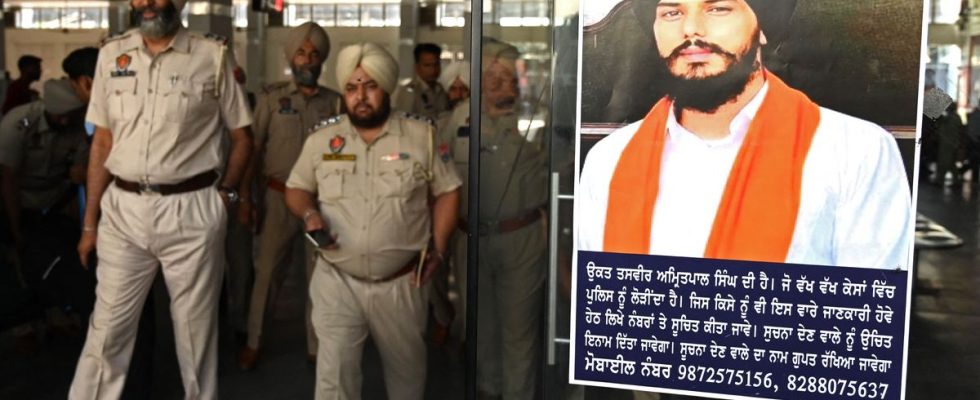His escape had reacted as far as the United Kingdom, Canada and the United States. After a month on the run, Sikh separatist preacher Amritpal Singh was finally arrested in India on Sunday, local police said.
Authorities have been on his trail since the 30-year-old Sikh leader and his followers, armed with swords, knives and guns, stormed a police station in February after the arrest of a of Singh’s aides for alleged assault and attempted kidnapping.
He demanded the creation of a Khalistan
The attack in broad daylight in the suburbs of Amritsar, a city in northwestern India which is home to the holiest of Sikh temples, the Golden Temple, left several police officers injured. After a long run, Singh was arrested Sunday at 6:45 a.m. local time (1:15 a.m. GMT) in a village in the state of Punjab, in northwestern India. “Once he realized he had no escape and was surrounded, he was arrested,” senior local police official Sukhchain Singh Gill told reporters. The fugitive was nearby, in a temple.
Amritpal Singh has made a name for himself in recent months by preaching radical Sikhism, going so far as to demand the creation of a Sikh state called Khalistan to secede from India, a country with a Hindu majority. His idol: Jarnail Singh Bhindranwale, radical leader and symbol of the Khalistan movement, killed in 1984 after the Indian army’s assault on separatists at the Golden Temple, which left at least 400 dead.
The ex-fugitive sports a blue turban similar to the one worn by Bhindranwale, has a long beard and even reportedly underwent surgery in Georgia to look even more like his hero.
“I have never been afraid of being arrested and I am not today”
After the attack on the police station in Amristar, authorities had tried to arrest the preacher, but he had made a dramatic escape on a motorbike after changing hastily at a nearby temple.
More than a hundred of his supporters had been arrested, and the entire state of Punjab, which has 30 million inhabitants, 58% of whom are Sikhs, had been deprived of mobile internet for several days.
That didn’t stop the preacher from taunting authorities in a video posted to social media in late March. Seen in Delhi, he described the police operation as an “attack on the Sikh community”. “I’ve never been afraid of being arrested and I’m not today. My morale is good. Nobody can hurt me. It is the will of God,” he said.
The video has not been independently verified, but there is little doubt about its authenticity. It had been posted on Twitter accounts based in Britain and Canada, but the social network had removed them in India at the request of the government.
Anger Abroad
This hunt had even reacted internationally. Its supporters have organized demonstrations of support in front of Indian consulates in the United Kingdom, Canada and the United States, sometimes punctuated by acts of vandalism.
In San Francisco, protesters smashed windows; in London, an Indian flag was torn from the embassy, and in the Canadian province of Ontario, a statue of Gandhi was ransacked.
India has summoned US, British and Canadian diplomatic representatives to New Delhi to protest and demand security for Indian missions in those countries. India has often complained about the activity of the Sikh diaspora abroad, which New Delhi believes could revive the separatist movement thanks to massive financial aid.
The state of Punjab, where 58% Sikhs and 39% Hindus live, experienced violent separatist movements in favor of Khalistan in the 1980s and early 1990s, which left thousands dead.

